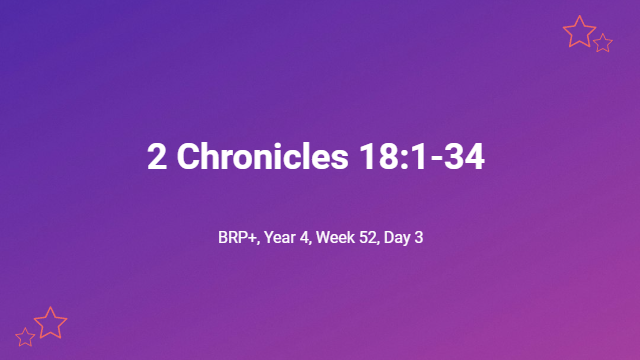2 Chronicles 18:1-34
Q.1. What made Jehoshaphat join Ahab in battle? How did Jehoshaphat try to discover God’s will? How did he know the prophets were false? – (2 Chr.18:1-6)
God had greatly prospered Jehoshaphat’s reign. Why, then, did he get entangled with the wicked Ahab and idolatrous Jezebel? Through a marriage alliance (2 Chr.18:1-2). Conversation soon turned to plans to support Ahab in his desire to conquer Ramoth-gilead. However, Jehoshaphat was cautious. He wanted confirmation from the Lord (2 Chr.18:4). However, the four hundred prophets whom Ahab presented did not behave like genuine servants of the Lord. Therefore, Jehoshaphat asked – … “Is there not yet a prophet of the Lord here that we may inquire of him?” (2 Chr.18:6).
Q.2. Why did Ahab hate Micaiah? How was Micaiah different from the false prophets? – (2Chr.18:7-13)
Ahab had ignored God and had set up his own entourage of phonies who would agree with him. Not until he was pressured, did he inform Jehoshaphat – … “There is yet one man by whom we may inquire of the Lord, but I hate him, for he never prophesies good concerning me but always evil. He is Micaiah, son of Imla.” … (2 Chr.18:7). How inconvenient when a servant determines that he will only speak the truth. – 12 Then the messenger who went to summon Micaiah spoke to him saying, “Behold, the words of the prophets are uniformly favourable to the king. So please let your word be like one of them and speak favourably.” 13 But Micaiah said, “As the Lord lives, what my God says, that I will speak.” (2 Chr.18:12-13). This prophet of God could not be bought.
Q.3. How do we know that Micaiah’s initial response was cynical? How did Ahab and the false prophets like Micaiah’s message from God? – (2 Chr.18:14-26)
Micaiah had been warned that all the false prophets had agreed with Ahab’s intentions. We know Ahab did not take Micaiah’s comments seriously, since he responded – … “How many times must I adjure you to speak to me nothing but the truth in the name of the Lord?” (2 Chr.18:15). In response, Micaiah delivered a withering prophecy of defeat, and of the death of Ahab in battle. He revealed that the people would be left without a shepherd, and that he had seen a vision of a divine plan to overthrow the designs of Ahab, through his own false prophets (2 Chr.18:18-22). Micaiah was mistreated by the chief false prophet and thrown into jail, until the king returned. Micaiah bravely reiterated to all the people in attendance, that if the king returned from battle, then his prophecy was not from the Lord (2 Chr.18:23-27).
Q.4. What did Ahab’s battle plan, and the outcome of the battle tell us about Ahab, Jehoshaphat, their soldiers, and God? – (2 Chr.18:27-34)
Ahab feared that Micaiah’s prophecy might just be true so he devised a plan to deceive both God and Jehoshaphat. He decided to disguise himself, and encouraged his son-in-law, Jehoshaphat to go into battle in his kingly robes. Unfortunately for Ahab, his final lesson was that God will not be mocked – A certain man drew his bow at random and struck the king of Israel in a joint of the armour. So he said to the driver of the chariot, “Turn around and take me out of the fight, for I am severely wounded.” (2 Chr.18:33 c.f. Gal.6:7-8). That random arrow came straight from the throne of God. At sunset, Ahab died. Jehoshaphat only barely escaped with his life, when he cried out to God – … and the Lord helped him, and God diverted them from him (2 Chr.18:31). The decision to have the right hero had brought Jehoshaphat blessing. However, his association with the wicked Ahab almost cost him his life. What a lesson.

